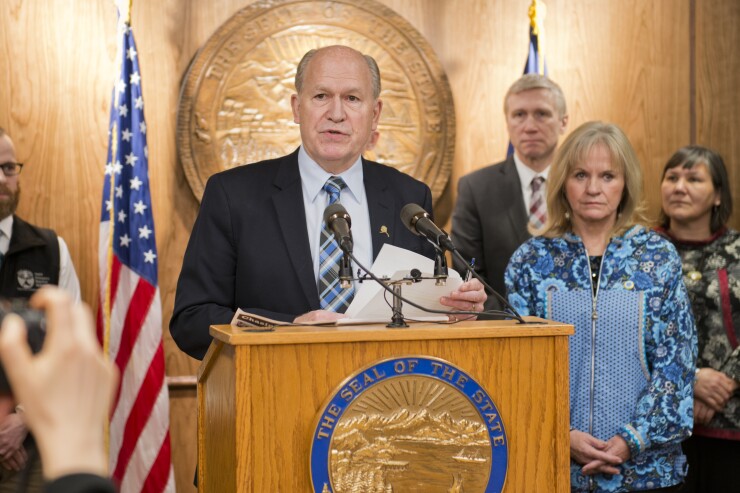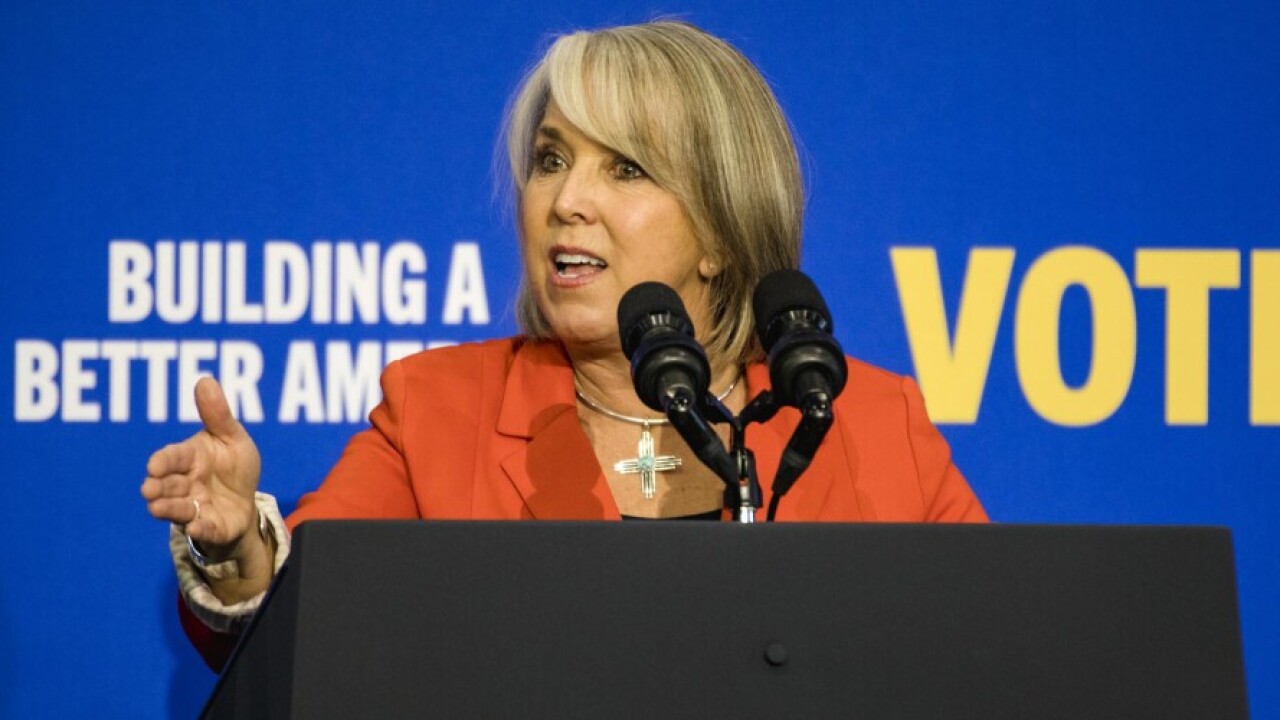An opinion from the Alaska Legislature's attorneys has called into question the constitutionality of Gov. Bill Walker's plan to pay off the state's outstanding oil and gas tax credit obligation that is currently in excess of $800 million.
Legislative Legal Services Deputy Director Emily Nauman wrote to Sen. Bill Wielechowski, D-Anchorage, April 13 that the administration's proposal to sell bonds to pay down the tax credits in one lump sum may fall outside the Alaska Constitution's tight restrictions on allowing the state to contract debt.
Wielechowski raised the issue regarding the legislation, SB 176, during the initial Senate hearing on it Feb. 21. At the time he said he would be seeking a legal opinion on the matter.

His office released the legal opinion April 18.
"Although the outcome is difficult to predict, this office is concerned that a court reviewing SB 176 may find that, for purposes of bonding under (Article IX, Section 11 of the Alaska Constitution) revenue of a corporation does not include appropriations from the traditional sources of state income, such as taxes and other receipts received by the General Fund. Therefore, there is a substantial risk that a court may determine that SB 176 is unconstitutional," Nauman wrote.
Legislative leaders in both parties have mostly gone quiet as end-of-session budget negotiations are underway but there is a general indication that they are not worried about the legality of the bonding plan.
However, there is the possibility that the questions from Wielechowski and Legislative Legal Services could raise the interest rates the state would have to accept to sell the bonds, at least slightly.
They are subject-to-appropriation bonds, and the state's financial reputation has taken hits in the last several years for a combination of not fully paying the tax credits each year starting with two vetoes by Walker in 2015 and 2016; the ad hoc setting of the Permanent Fund dividend without regard to the statutory formula either through veto (in 2016) or legislative action (in 2017 and 2018); and the Legislature using the subject-to-appropriation clause to leave Anchorage developers on the hook for a $28 million loan by abandoning the Legislative Information Office they commissioned and occupied for less than two years.
The state's failure to adopt fiscal measures to deal with annual deficits topping $2 billion has also led to the once perfect AAA credit rating being downgraded to the third lowest in the country.
Wielechowski said in an interview he does not plan to challenge the legislation in court if it passes, but rather that he simply wanted to bring the issue to light.
"We went back and read the Constitutional Convention minutes. This is the exact kind of thing they were trying to stop. They didn't want the Legislature and the administration racking up debt for future generations," Wielechowski said.
The state Constitution prohibits lawmakers and state agencies from selling bonds except in the cases of an emergency; if they are general obligation bonds for capital projects; or housing loans for veterans and approved by voters statewide. State corporations may also sell revenue bonds but they are the obligation of that corporation and not the state as a whole and are backed by some segment of the corporation's revenue.
SB 176 and its mirror House Bill 331 -- both in their respective Finance committees -- would create the Alaska Tax Credit Certificate Bond Corp. within the Department of Revenue to sell the bonds and pass the proceeds of the sales on to the bond holders, of which there are 37, according to Deputy Revenue Commissioner Mike Barnhill.
The bonds would be "subject to appropriation" meaning the revenue to pay for them would be contingent upon the Legislature appropriating money to pay the debt service each year.
"This bill seeks to avoid the constitutional ban (on bond debt) by creating a pass-through state corporation whose sole purpose is to put the state in debt to pay the oil companies," Wielechowski said. "Oil tax credits are clearly not an allowable state debt prospect, but the bill also jeopardizes the state's credit rating without asking for the people's say."
He also noted the state corporation would have no employees, revenue or assets in a statement from his office.
Alaska Attorney General Jahna Lindemuth offered a quick counter to the Wielechowski and the Legislative Legal memo, contending in a statement from the Department of Law that the bonds proposed in the legislation are not general obligation bonds and the department has no constitutional concerns with the proposal because it is "consistent with long-established bond issuance practice in Alaska," the Law release states.
"We've carefully reviewed the legal issues and are confident that these bonds are lawful under Alaska law," Lindemuth said.
Attorneys with the Department of Law have stressed the subject-to-appropriation provision would make the bonds constitutional because it prevents the state from being totally bound to the debt.
"It's an important obligation but if you buy a subject-to-appropriation bond and the authority that issued it did not make a debt payment -- unlike a general obligation bond where the court would order a payment -- if you went to a court the court would say 'It says right on your bond it's subject to appropriation;' that's sort of the dividing line for us," Assistant Attorney General Bill Milks testified to the House Finance Committee April 21.
Nauman, who wrote the Legislative Legal opinion, testified on the other hand that because the revenue to pay for the bonds would strictly be tax revenue appropriated from the General Fund they are not traditional revenue bonds. As a result, the proposal creates legal ambiguity and the division can't advise that the plan is constitutional until there is precedent, which there isn't.
State Debt Manager Deven Mitchell said during the Feb. 21 Senate Resources hearing that the situation would be similar to how the state financed the Goose Creek Correctional Facility in the Matanuska-Susitna Borough. In that case the borough issued revenue bonds on the state's commitment to pay through its lease of borough lands.
According to an April 16 letter from Mitchell to Revenue Commissioner Sheldon Fisher, the state currently has $237 million of outstanding subject-to-appropriation bonds related to the Mat-Su prison and the Alaska Native Tribal Health Consortium residential housing facility.
It's worth noting that someone with standing must challenge the constitutionality of a law or state spending for the legality of the issue to be determined; it is legal until someone decides to expend the resources and energy needed to prove it's not.
Administration officials have also pointed to a 1995 Alaska Supreme Court ruling in the case of Carr-Gottstein Properties v. the State of Alaska in which the court determined that a lease-purchase agreement was not unconstitutional debt because the obligation to pay was again subject to appropriation by the Legislature.
However, Wielechowski contends the case ruling is irrelevant to the bond issue because it centers on a property lease, which is different than selling bonds in financial markets.
The administration is touting the plan as a way to pay off the tax credits, which are expected to reach a roughly $1 billion bill in another year or two once the last of the credit certificates from the terminated program are submitted to the state for approval.
The credits went to small producers, explorers and seismic data companies to subsidize a portion of their work on the hope the state help could spur more oil and gas production more quickly as payback for the state.
Paying off the obligation quickly could also restart work slowed or stalled by small producers and explorers that have cited the lack of payments as a primary reason numerous companies have had to hold off previously planned investments. Adding to the issue is the fact that several banks provided loans to companies with the credit certificates as collateral; and when the credits were not paid as expected the banks stopped lending to the Alaska oil and gas sector, according to multiple companies, banks and Department of Revenue officials.
Lender gives thumbs up at House hearing
Despite the swirling issues of the constitutionality of the legislation, the House Finance Committee continues to work on HB 331.
The committee heard broad support for the bill April 23 from oil and gas and finance industry representatives who said it could reinvigorate investment in the state.
ING Managing Director Thomas Ryan said the large international bank lent against credit certificates to two oil companies working in the state in 2015.
ING's Peter Clinton said the process the state has gone through in dealing with the tax credit program since oil prices collapsed in late 2014 is not unlike what often happens elsewhere.
"This is a fair and balanced proposal. It is consistent with the types of proposals you would see in private industry where you take an obligation that you recognize that you have and you try to get a solution to that problem where everybody participates," Clinton testified.
He said the legislation would likely enhance the state's reputation in the finance realm greatly over doing nothing, as it would provide path to a solution.
"Private lenders are not put off by situations like this where something unexpected happens and you have to figure out a way to deal with it," Clinton said further. "Ultimately, at the end of the day what they look for in the solution is the ability for there to be a predictable payout."
The difference is that the state deals with its problems over years, in which one aspect of the issue is often handled each legislative session, as opposed to weeks or months it takes to resolve problems between private parties, he added.
Passing either SB 176 or HB 331 would resolve a difference of opinion between the Democrat-led House and Republican-dominated Senate over how much to spend on the credits this year in the budget.
The House budget appropriates $49 million to the Oil and Gas Tax Credit Fund, while the Senate would have the state put $184 million into the fund based on differing interpretations of the production tax-derived formula that is used to generate the statutory minimum production tax credit payment.
The House amount is based on a calculation that uses the amount of production taxes the state is actually expected to receive in 2019, while the Senate's calculation is based on the wholesale production tax amount before deductible credits are applied. The administration is backing the Senate, as its calculation is the formula that has been used the past two years.





